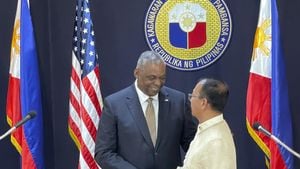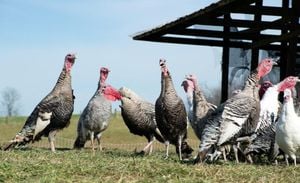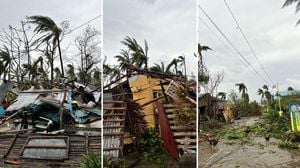Independent politicians have raised alarms after the Australian government introduced reforms they claim favor the established political parties, effectively rigging the electoral system. The controversy erupted when the Albanese government proposed new legislation aimed at controlling the influence of large donations on political campaigns. This reform, they argue, is necessary to strengthen democracy amid concerns about undue financial influence from billionaires. Yet, many independents see it differently, citing their fears of entrenching existing party dominance.
The independent MP Kate Chaney labeled the proposed changes as a "travesty." She, along with the crossbench MPs, attempted to push for more transparency by sending the proposed legislation to parliamentary scrutiny. Their efforts were thwarted by Labor, which has worked closely with the Coalition to craft the bill, effectively ensuring its passage through Parliament without needing support from minor party representatives.
Under the outlined legislation, the rules concerning electoral funding will drastically change. For starters, the threshold for donation disclosure will drop to $1,000 from the previous cap of $16,900, making it mandatory for parties to disclose donations more frequently and transparently. The reforms also impose limits on individual candidates' campaign expenditures, capping it at $800,000 and allowing only $20,000 donations from individuals.
Assistant Minister to the Prime Minister, Patrick Gorman, defended the legislation, stating it ensures greater transparency and aims to reduce the sway of “big money” on elections. He underscored the bill's importance, saying, "This bill will seek to remove the influence of big money in politics, ensuring our electoral system remains trustworthy,” indicating their aim to promote elections based on ideas rather than financial clout.
Further limitations will apply to federal spending, which includes constraints for non-political entities, like unions and special interest groups, capped at $11 million, whereas political parties will have access to significantly larger funds, capped at $90 million. Critics of the reform like Chaney argue these measures effectively consolidate power within the major parties, enhancing their financial advantages.
Chaney's fellow independents, like Zali Steggall and Jacqui Lambie, voiced outrage at what they see as anti-competitive maneuvers. Steggall likened the situation to the duopoly of major grocery chains, asserting, "They’re rigging the game to make sure there’s no competition when it’s time for the voters to choose.” Likewise, Lambie expressed her disgust at the perceived collusion, stating, "Merry Christmas, Australians, here come the major parties taking more of your cash.”
Notably, one significant player involved has been billionaire Clive Palmer, who spent over $120 million during the 2022 elections, raising alarms about the power of wealthy donors. Palmer has threatened legal action, claiming the laws infringe on freedom of speech and were constructed to limit political competition. Labor's position hinges on the idea of leveling the playing field against billionaires seeking to bend electoral outcomes.
Despite fears of consolidations among major parties and rising public dissent, some within Labor maintain these reforms are necessary to maintain democratic values within politics. Special Minister of State Don Farrell reiterated this point, arguing the caps would protect election results from being undesirably altered by large donations.
Adding complexity to the conversation surrounding electoral funding, Senator Matt Canavan from the Nationals raised questions about the effectiveness of such caps, expressing concerns about how they might centralize campaign controls. He noted, "It’s just about finding balance...but I think there probably needs to be some restraint on unlimited amounts of money.” His comments reflect broader anxieties within the Coalition about how these reforms might affect their dynamics and operations.
Another aspect of the bill aims to protect voters and electoral workers from harassment at polling stations, transitioning away from outdated practices where polling officials could be filmed without consent. This, too, has drawn mixed reactions among independents and smaller parties.
The current situation is poised on the brink of significant change, leading to disputes over whether the reforms will genuinely lead to enhanced transparency or merely entrench the established power structures. Observers note the legislation will not come fully online until after the 2025 elections, adding layers of complexity to the immediate political milieu.
Critics have labeled the bill as “bureaucratic overreach” and argued it disregards the aspirations of new entrants to the political arena. The prevalent sentiment is frustration among independents and minor parties who fear they will be sidelined by reforms saluted as necessary by the major parties. Chaney concluded by reiteratively asking, “Why does this need to be rushed through?” highlighting the perceived urgency by major parties to push through regulations they feel will regain traction with the electorate.
Though changes to the electoral donations system could ostensibly lead to improved transparency, the fears expressed by the independents reflect broader concerns over the potential worsening of electoral competition and the risk of solidifying the already strong holds of established political entities.
With tensions mounting and the end of the parliamentary session looming, the eyes of both supporters and detractors remain fixated on how this legislation may reshape the face of Australian politics for years to come.



